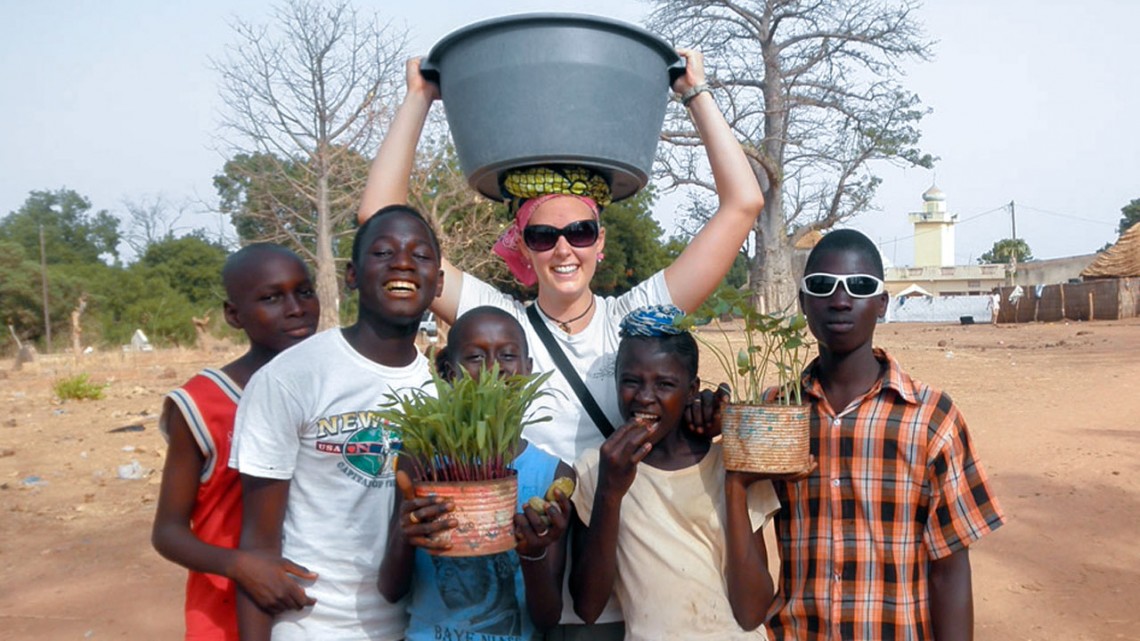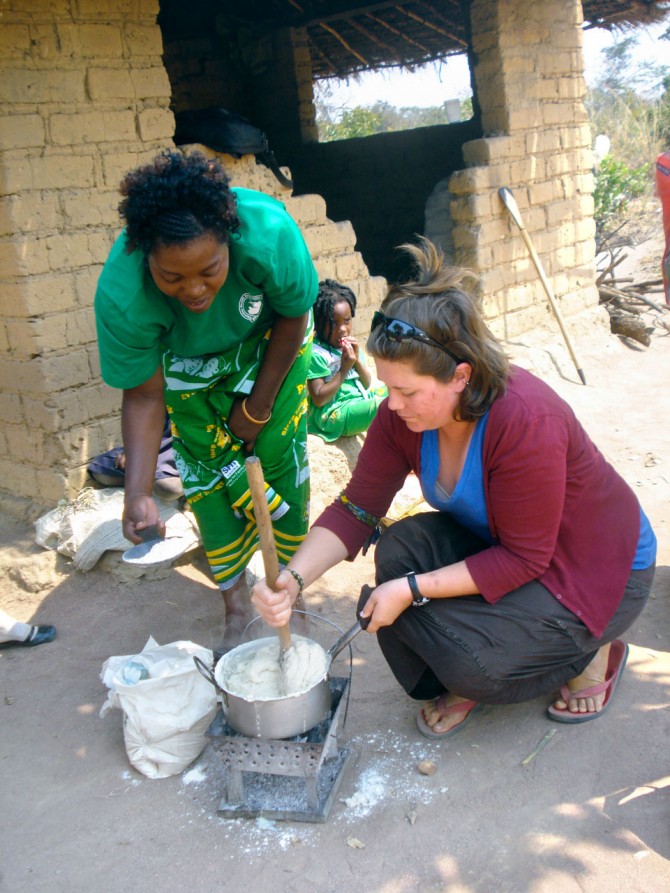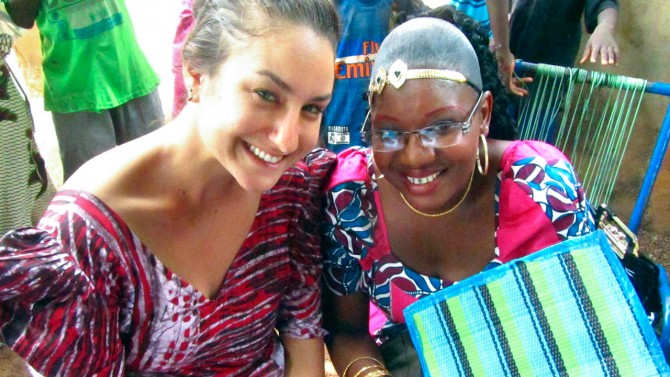
Peace Corps volunteer Danielle Stoermer, MPS ’13, center, and children in Senegal transport seedlings from her backyard to a community garden in 2011. Stoermer, who served in Senegal, is one of more than 1,700 Peace Corps volunteers Cornell has produced since the organization was founded in 1961.
Service, connection, leadership: Cornellians in the Peace Corps
By Jamie Crow
Amanda Freund ’06 and Janet Smith, M.S. ’19, took different paths to the Peace Corps, but share common ground in their experiences: learning from the people they served.
In 2010, Freund volunteered for a two-year position in Zambia, where she focused on food and agriculture – familiar terrain following her studies in College of Agriculture and Life Sciences and her work on her family’s dairy farm in Connecticut. She discovered, however, that she had a great deal to learn from the resource-strapped communities where she worked. By her second year, her focus had shifted from not only improving conditions but also understanding Zambian practices and approaches.
“I started my service thinking about how I was going to make improvements to what they do,” Freund says, “and I left absorbing those changes and realizing that I’m the one who really got to be improved from the experience.”
Smith and Freund are part of a rich Cornell tradition that stretches back to Peace Corps’ founding 60 years ago, when President John F. Kennedy launched the corps to foster cooperation and connections across cultures worldwide.
Since then, Cornellians have played a major role in the organization’s success — from early work by founding staff member Richard Ottinger ’50 to the hundreds of Cornell alumni who’ve volunteered since 1961.
Ottinger ’50 helped establish the Peace Corps and served as director of programs for the west coast of South America in the early 1960s. More than 1,700 Cornell alumni have followed his lead, serving in 118 countries. Approximately 40 Cornell alumni volunteer with the Peace Corps annually, says Joshua Voda, Peace Corps public affairs specialist; in 2020, the Peace Corps ranked Cornell No. 6 in the country among medium-sized schools for producing Peace Corps volunteers.
“Public service is part of Cornell’s mission and vision,” says Mia Ferraina, public service careers coach in Cornell Career Services, who advises students interested in the Peace Corps. “There are all these pockets of people who care about serving the community and doing it in an ethical way. The structure of the Peace Corps really echoes the community partnership model that a lot of the offices and programs have [at Cornell].”
Freund says the most rewarding aspect of her service in Zambia was a nutrition intervention program to support mothers with young children, which helped them boost regular meals with high-protein supplements derived from ground caterpillar, peanut flour and soy. All the children, except for one who had contracted malaria, gained weight on the fortified diet.
“Being committed to seeing that project through and them feeling so positive about what they gained, I feel like my level of recognition in the community – that was what put me over the edge,” Freund says. “Part of what made it so satisfying to me was that it took so long to get there.”
Similarly, Smith, who served twice in the Peace Corps, says that in both cases partnering with locals, observing their techniques and listening to their perspectives taught her valuable lessons in international development.
Smith first worked as a health volunteer in Senegal from 2012-14, then traveled to Mali in 2014 as part of a team of experienced volunteers to help with water and sanitation projects. While in Mali, the Ebola outbreak raged in nearby West Africa nations, and Smith worked with a small nonprofit to build and maintain latrines and protect community health through improved sanitation. Smith learned to oversee a project from start to finish; just as valuable, she says, were innovative ideas and practices she witnessed firsthand in Mali.
“I think that’s a strength of doing Peace Corps. … You just see the value and intelligence of the community and a local culture that’s so different from your own,” says Smith, who was accepted into a Cornell graduate program in development sociology while volunteering. “I love listening and learning from people, so that perfectly fit my personality.”
Throughout her studies at Cornell, Smith applied lessons and experiences from her Peace Corps service, allowing her to take a critical look at the field of international development and find ways to make it more effective for those most in need. “When I was doing theoretical readings and academic work, I was able to think back on my Peace Corps experience and apply academic viewpoints to what I had seen in the field,” she says.
Smith recently began a new position at the Cornell Atkinson Center for Sustainability, where she will combine her firsthand knowledge from the Peace Corps with the research approach drawn from her Cornell degree.
Freund has returned to helping with her family dairy farm, while also growing a sustainable farming enterprise, CowPots. She carries many reminders of her time in Zambia with her including a garden hoe; the farmers she assisted used it for everything from spreading compost to fending off rodents.
With Peace Corps operations on hold in many areas due to the COVID-19 pandemic, Freund hopes volunteers – including the many Cornellians involved – can soon return to their service opportunities.
“I think it’s such an asset to this country, for the Americans who participate in it and to bring those experiences back to their communities,” Freund says. “In the midst of this pandemic, and so many places hurting in different ways, I just am so hopeful that the relationship Cornell has with the Peace Corps will continue to be a strong and verdant one.”
Jamie Crow is a communications specialist in the Office of Strategic Communications. This article is adapted from the original, “Service, connections, leadership: 60 years of Cornellians in the Peace Corps.”
Media Contact
Get Cornell news delivered right to your inbox.
Subscribe


